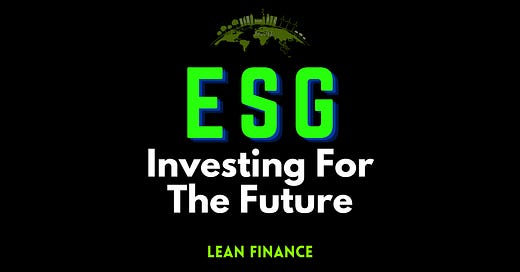ESG Investing Here To Stay?
Where we are today and the challenges faced by ESG in delivering positive impact and financial returns
Are you an investor looking to make a positive impact on society with your money? Have you heard of ESG investing, but aren’t sure if it’s right for you? Read on to find out what ESG investing is, its history, and why it could be a meaningful way for your portfolio to make an impact.
What is ESG Investing?
ESG stands for Environmental, Social, and Governance – three of the most important areas of scrutiny for long-term sustainable investment practices. ESG investing focuses on companies that are actively taking steps to mitigate risks related to these three areas, and that also have a commitment to creating a positive society and environment.
In other words, rather than just focusing on the financial performance of a company, with ESG investing, you would also be looking at the impact the company has on the environment, social issues, and the way it is governed. ESG investing is an ethical approach to investing, where you are optimizing for both financial returns and impact on society. Taking a break right here to digress– It is often argued that ESG investing generates both lower risk and higher performance, which seems at odds with the key prescription from finance theory.
The History of ESG Investing
The term ESG investing has only become widely used in the last few years, but the concept is not new. The first ESG fund was launched in 1974 by a group of socially conscious investors who wanted to ensure that their money was being put to good use. Since then, the idea has gained traction and become a much more mainstream practice in the 21st century.
Over the past few years, ESG investing has significantly gained in popularity as younger generations of investors look for a way to make a difference with their money. Keeping it real guys, the current generation of investors and earners (guilty as charged) aren’t extremely eager about funding companies that are making the environment and the world worse off … Am I right?
Thanks to increased technology and data, investors can now gain access to more comprehensive information on the ESG performance of companies, allowing them to make more informed decisions about where to invest their money.
Advantages of ESG Investing
There are many benefits to ESG investing. By taking into account environmental and social factors, investors are better able to identify which investments could be more profitable in the long term due to having a more holistic view of a company’s performance. It’s gospel today that companies moving towards sustainability will be the champions of tomorrow and it’s always financially prudent to bet on winners. In addition, investing with ESG principles can provide more transparency into companies and industries that investors may not have access to otherwise. With more companies embracing the ESG framework, investors now have more options than ever to make a positive impact with their savings.
Should You Invest with ESG Principles?
ESG investing is no longer just a passing fad – it’s becoming increasingly popular among investors of all ages. While traditional investing may still remain the most popular option, ESG investing could be a great way to make an impact with your money while still being mindful of your financial goals.
As an individual investor unable to go through thousands of company ESG reports, it’s much simpler to invest in ESG funds that include only those companies that prioritize ESG performance.
An Unexpected Hurdle
From a recent article in the Harvard Business Review, ESG funds have been shown to perform poorly in financial terms. In a Journal of Finance paper, researchers from the University of Chicago analyzed the Morningstar sustainability ratings of more than 20,000 mutual funds representing over $8 trillion of investor savings. Even though the highest-rated funds in terms of sustainability attracted more capital than the lowest-rated funds, none of the high-sustainability funds outperformed any of the lowest-rated funds.
Well, one might say, ESG investing is focused on the greater good of society rather than solely on financial returns, but a major red flag has been uncovered.
Unfortunately, ESG funds don’t seem to deliver better ESG performance either. Researchers from Columbia University and the London School of Economics discovered that companies do not increase their ESG performance with time and often barely comply with environmental and labour rules. The reasons for the bleak ESG performance are abundant with many originating from opaque ESG standards and definitions for metrics.
Making The Leap of Faith?
All in all, the importance of ESG will evolve and grow with time and along with it the benchmarks that explain ESG performance. So while you ponder about impact investing and whether your investments are really making an impact, dig deeper into the companies you think are sustainable and if the promises they make are truly kept!
Sustainability and growth must coexist. Look at nature: things only sustain themselves when they continually grow. Growth is a prerequisite for sustainability.





